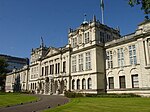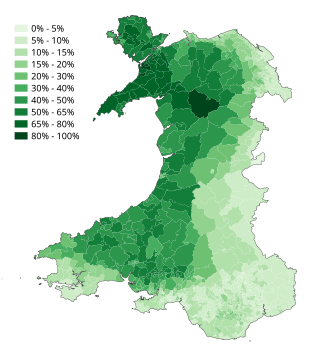
Welsh is a Celtic language of the Brittonic subgroup that is native to the Welsh people. Welsh is spoken natively in Wales, by some in England, and in Y Wladfa.

Wales is a country that is part of the United Kingdom. It is bordered by England to the east, the Irish Sea to the north and west, the Celtic Sea to the southwest and the Bristol Channel to the south. As of the 2021 census, it had a population of 3,107,494. It has a total area of 21,218 km2 (8,192 sq mi) and over 1,680 miles (2,700 km) of coastline. It is largely mountainous with its higher peaks in the north and central areas, including Snowdon, its highest summit. The country lies within the north temperate zone and has a changeable, maritime climate. The capital and largest city is Cardiff.

Cowbridge is a market town in the Vale of Glamorgan, Wales, approximately 12 miles (19 km) west of the centre of Cardiff.

William Williams, Pantycelyn, also known as William Williams, Williams Pantycelyn, and Pantycelyn, is generally seen as Wales's premier hymnist. He is also rated among the great literary figures of Wales, as a writer of poetry and prose. In religion he was among the leaders of the 18th-century Welsh Methodist revival, along with the evangelists Howell Harris and Daniel Rowland.

The University of Wales is a confederal university based in Cardiff, Wales. Founded by royal charter in 1893 as a federal university with three constituent colleges – Aberystwyth, Bangor and Cardiff – the university was the first university established in Wales, one of the four countries in the United Kingdom. The university was, prior to the break up of the federation, the second largest university in the UK.
This article provides an overview of education in Wales from early childhood to university and adult skills. Largely state funded and free-at-the-point-of-use at a primary and secondary level, education is compulsory for children in Wales aged five to sixteen years old. It differs to some extent in structure and content to other parts of the United Kingdom, in the later case particularly in relation to the teaching of the Welsh language.
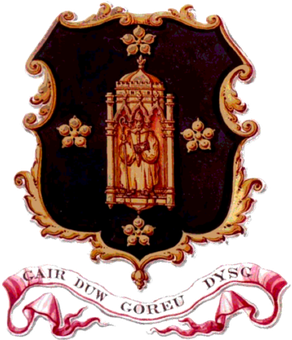
University of Wales, Lampeter was a university in Lampeter, Wales. Founded in 1822, and incorporated by royal charter in 1828, it was the oldest degree awarding institution in Wales, with limited degree awarding powers since 1852. It was a self-governing college of the University of Wales from 1972 until its merger with Trinity University College in 2010 to form the University of Wales Trinity Saint David.
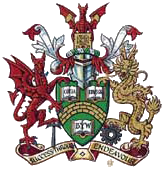
The University of Glamorgan was a university based in South Wales prior to the merger with University of Wales, Newport, that formed the University of South Wales in April 2013. The university was based in Pontypridd, in Rhondda Cynon Taf, with campuses in Trefforest, Glyntaff, Merthyr Tydfil, Tyn y Wern and Cardiff. The university had four faculties, and was the only university in Wales which had no link with the University of Wales.

The National Library of Wales, Aberystwyth, is the national legal deposit library of Wales and is one of the Welsh Government sponsored bodies. It is the biggest library in Wales, holding over 6.5 million books and periodicals, and the largest collections of archives, portraits, maps and photographic images in Wales. The Library is also home to the national collection of Welsh manuscripts, the National Screen and Sound Archive of Wales, and the most comprehensive collection of paintings and topographical prints in Wales. As the primary research library and archive in Wales and one of the largest research libraries in the United Kingdom, the National Library is a member of Research Libraries UK (RLUK) and the Consortium of European Research Libraries (CERL).
Trefeca, located between Talgarth and Llangorse Lake in what is now south Powys in Wales, was the birthplace and home of the 18th-century Methodist leader Howell Harris (1714–1773),. It was also the site of two Calvinistic Methodist colleges at different times; the first sponsored by Selina, Countess of Huntingdon in the late eighteenth century; the second supported by the Welsh Calvinistic Methodist Connexion in the later nineteenth century.

Welsh nationalism emphasises and celebrates the distinctiveness of Welsh culture and Wales as a nation or country. Welsh nationalism may also include calls for further autonomy or self-determination, which includes Welsh devolution, meaning increased powers for the Senedd, or full Welsh independence.
The 1904–1905 Welsh revival was the largest Christian revival in Wales during the 20th century. It was one of the most dramatic in terms of its effect on the population, and triggered revivals in several other countries. The movement kept the churches of Wales filled for many years to come, seats being placed in the aisles in Mount Pleasant Baptist Church in Swansea for twenty years or so, for example. Meanwhile, the Awakening swept the rest of Britain, Scandinavia, parts of Europe, North America, the mission fields of India and the Orient, Africa and Latin America. The Welsh revival has been traced as the root of the megachurches in the present era.
Geiriadur Prifysgol Cymru (GPC) (The University of Wales Dictionary) is the only standard historical dictionary of the Welsh language, aspiring to be "comparable in method and scope to the Oxford English Dictionary". Vocabulary is defined in Welsh, and English equivalents are given. Detailed attention is given to variant forms, collocations, and etymology.
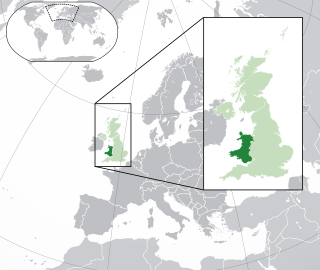
The history of the Jews in Wales begins in the 13th century. However, after the English conquest of Wales (1287-1283), Edward I issued the 1290 Edict of Expulsion expelling the Jews from England. From then until the formal return of the Jews to England in 1655, there is only one mention of Jews on Welsh soil.

Aberystwyth is a university and seaside town and a community in Ceredigion, Wales. It is the largest town in Ceredigion and 16 miles (26 km) from Aberaeron, the county's administrative centre. In 2011, the population of the town was 15,935.

Welsh English comprises the dialects of English spoken by Welsh people. The dialects are significantly influenced by Welsh grammar and often include words derived from Welsh. In addition to the distinctive words and grammar, a variety of accents are found across Wales, including those of North Wales, the Cardiff dialect, the South Wales Valleys and West Wales.

The University of Wales Trinity Saint David is a multi-campus university with three main campuses in South West Wales, in Carmarthen, Lampeter and Swansea, a fourth campus in London, England, and learning centres in Cardiff, Wales, and Birmingham, England.

The University of South Wales is a public university in Wales, with campuses in Cardiff, Newport and Pontypridd. It was formed on 11 April 2013 from the merger of the University of Glamorgan and the University of Wales, Newport. The university is the second largest university in Wales in terms of its student numbers, and offers around 500 undergraduate and postgraduate courses. The university has three main faculties across its campuses in South Wales.

This is a bibliography of published works on the history of Wales. It includes published books, journals, and educational and academic history-related websites; it does not include self-published works, blogs or user-edited sites. Works may cover aspects of Welsh history inclusively or exclusively.

Martin Paul Eve is a British academic, writer, computer programmer, and disability rights campaigner. He is the Professor of Literature, Technology and Publishing at Birkbeck College, University of London, Principal R&D Developer at Crossref, and was Visiting Professor of Digital Humanities at Sheffield Hallam University until 2022. He is known for his work on contemporary literary metafiction, computational approaches to the study of literature, and open-access policy. Together with Dr Caroline Edwards, he is co-founder of the Open Library of Humanities (OLH).














